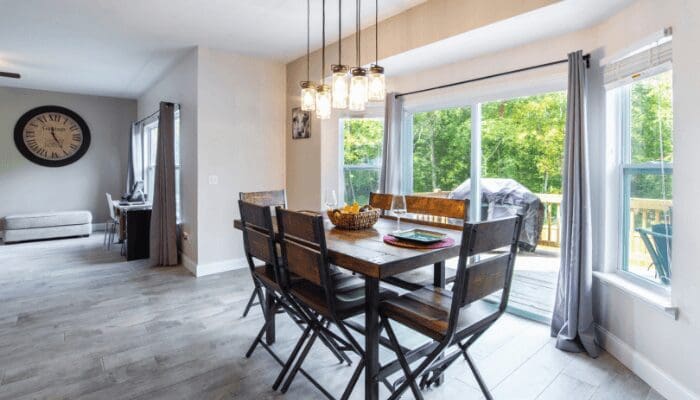7 Listing Price Mistakes Sellers Make All the Time (And How to Steer Clear of Them!)
- Published on
- 6-7 min read
-
 Whitney McKinnon Contributing AuthorClose
Whitney McKinnon Contributing AuthorClose Whitney McKinnon Contributing Author
Whitney McKinnon Contributing AuthorWhitney McKinnon is a professional writer whose work has recently appeared on Yahoo, SlickText.com, HelloGiggles, Bolde, and The Hoth.
If you’ve ever spent a morning home sick on the couch watching The Price Is Right, you know how tricky it can be to estimate the value of a toaster. A toaster.
So it’s no wonder that putting a price on something as large and costly as your home can be so daunting to sellers.
Choosing a listing price for your home is a delicate balance that requires a lot of background research and market knowledge. If you go too high, your home might stagnate on the market for weeks, or even months. The truth is overpricing (rather than underpricing) is most sellers’ Achilles’ heel.
A trusted real estate agent will be able to guide you in the right direction, but your gut reaction might be to ignore their advice because you don’t like it or have unrealistic expectations. To avoid being your own worst enemy, review these seven common listing price mistakes. Then ask yourself:
Is this me?
If the answer is yes, get ready to course correct…and fast.

Mistake #1: Pricing on the high end and making cuts until it sells.
Pricing your home too high is a great way to set yourself up for future frustration when you’re first putting your home on the market.
“You do not want your home sitting on the market and just lower the price on an ongoing basis,” according to Timothy Sojka, one of Houston’s top selling real estate agents. “It puts the seller in a position of weakness.”
The longer your home cools on the market, the less “hot” it’s going to appear to buyers—who may wonder why it hasn’t sold or what’s wrong with it. The resulting stigma can be enough to put a damper on an otherwise promising lead.
What to do instead: price your home right at or even slightly below fair market value. According to Sojka, “The seller wins if we’re priced just a tad too low.”
If your listing price is just under market value, you’re more likely to get promising bites on your listing in less time than if you’d overpriced. You’ll have more negotiating power with more than one offer on the table, and can use the resulting leverage to facilitate a bidding war that can end up going even higher than your asking price.
You won’t even have time to lower the listing price; you’ll be too busy fielding promising offers instead.
Mistake #2: Listing with the agent who said your house was worth more.
There’s nothing stopping unscrupulous agents from telling sellers exactly what they want to hear. However, choosing an agent who knows how to compete in a hot market is going to get you real results.
“I tell people all the time: you’ve got to determine whether you want to like me now or like me later,” says Sojka. “If I’m really tough on you and get you priced right, you won’t like me that day, but you’ll like me three months from now when you’re in your new home and your other home is long gone.”
Instead of hiring the agent who pulls up with a flashy car and big promises, opt for the one who can back up everything they say with real numbers.
When you’re interviewing an agent, make sure to find out:
- How many homes have they sold in your area?
Pay attention to the number of homes they’ve closed, not just the ones they’ve listed. - What percentage of listing price did these homes end up selling for?
Ideally your agent’s average list-to-sale price ratio will be in the 90%-100+% range. Anything lower indicates that they’re unable to command a seller’s asking price and may be pricing too high from the start. - How many days did these homes spend on the market?
With this response, lower numbers are better. Every market’s typical days on market will vary, but the key is that your agent sells home faster than the average for your locale.
When you vet agents through Homelight, you can reference historical transaction data found in our detailed agent profiles. These feature a map of each agent’s transaction history so you can get a feel for their specific locale, as well as information about whether your prospective agent specializes in single family homes, condos, luxury homes, etc.
After getting real statistics and examples, you might be surprised which agent will give you the best shot at selling your home at—or close to—the listing price.
“The right Realtor might be the Realtor you like the least,” says Sojka. “It should be the Realtor who you feel is most prepared, can back up their pricing, and will spend time with you to tell you why that’s right.”
Your agent should be able to back up their pricing with a comparative market analysis (CMA) evaluating recently sold nearby properties that are similar to yours.

Mistake #3: Testing the market’s bounds because you’re ‘not in a hurry’
It’s true that a particularly motivated seller (someone who has to move for a job relocation or financial distress) might price their house low to prioritize speed of sale and get a quick offer.
But generally speaking, you should always aim to determine fair market value and price a house right, no matter your selling timeline.
This logic applies even if you plan to take your sweet time and don’t care when the house actually sells.
Otherwise, you’ll end up shooting yourself in the foot down the road if you let your home sit on the market for too long. Buyers are less likely to be excited about your home if they’ve already scrolled by it in their search results for months, and you’ll lose out on enjoying the powerful position of being the hot new home on the market.
“If you want to sell your house 6 months from now, call me in 3 months and we’ll sell it in the first two months,” advises Sojka.
That way, your listing will stay fresh and will be less likely to sit on the market when you do decide the time is right to make your move.
Mistake #4: Basing your list price on what you ‘feel’ your home is worth
It’s common to fall into the trap of thinking your home is worth more than it is based on the sentimental value it holds for you. But keep in mind that memories don’t pay the mortgage.
Keep emotions out of the conversation when you and your agent discuss the listing price for your home. You’ll want to be as objective as possible, and the best way to do that is by comparing sales in your area.
Look at recent sales (within the last 3-6 months) that are comparable to your home. Your agent should be able to handle this task for you. As a general rule, features that should be the same (or close to the same) include:
- Square footage of the home
- Lot size
- Number of bedrooms/bathrooms
- Year built (within 5 years)
- Condition of the home
- Any additional upgrades
When you know you’re comparing apples to apples, it can be a lot easier to look at the numbers without letting your emotions cloud your judgement.

Mistake #5: Using list prices (rather than sold prices) as your reference point
You’ve been chatting with a former neighbor, who mentioned that when she put her home on the market, it started at a listing price that was much higher than the figure your agent recommended for your neighborhood. You know her home sold, so what gives?
As important as the listing price is for a seller, it’s not the number that matters when assessing the market in your area. You can list your home for whatever price you want, but that doesn’t mean that a poorly priced home is going to get any promising offers—or any offers at all.
Especially in cases where the home doesn’t sell right away, there can be a major difference between the figure the home is listed at and the amount it eventually sells for.
That’s why the sold price of a home is a much better indicator of the local market than data from listing (or even pending) prices. This reflects what buyers in the area are realistically willing to pay for a comparable home, and you can price your home to sell accordingly.
Mistake #6: Factoring in your home improvements dollar for dollar
Say you spent $20,000 on a kitchen remodel three years ago, and now you’re ready to sell your home. Logic suggests that this upgrade should translate into an extra $20,000 added to your list price, but (unfortunately for sellers) that’s not how it works.
Buyers don’t care how much you sunk into the recessed lighting in your shower; if your home is priced higher than it should be for your area, it’s not likely to sell in a competitive housing market.
Renovating your home should be a decision made based on your current needs, not as a means to drive up the price for a future sale. This kind of thinking can result in overpricing your home and increasing the odds that it’ll stagnate on the market untouched.
Plus, not all improvements result in the same returns. In fact, some of the home renovation projects that can have the biggest impact on your listing price require a lot less cash to complete than you might think.
The best home improvement projects to recoup your cash are the simple ones: a repair as easy and inexpensive as replacing your garage door can recoup a 98.3% return on investment (ROI). On the flip side, sinking more than $200,000 on a major master suite addition will net you just 48.3% of your original cost.
If you’re considering a home renovation project while also planning to sell your home in the next several years, it might be worthwhile to meet with a real estate agent even if you’re not ready to list. They know the local market, and can help make sure you don’t sink your savings into a project that you won’t be able to recoup.

Mistake #7: Underestimating the costs of a stale or expired listing
Don’t fall into the trap of assuming that you have nothing to lose by not pricing your home right from the start.
A stale listing, or one that’s spent a lot of time on the market without selling, puts the pressure on. If it’s not sold in a timely fashion, the listing can start to lose its appeal to otherwise interested buyers. If enough time passes and the home doesn’t sell before the contract between the seller and agent runs out, the listing expires and the seller is free to relist with another agent.
For most people, it makes the most financial sense not to waste time after making the decision to sell their house. Holding onto a home longer than necessary can mean extra mortgage and insurance payments, as well as the additional cost of maintaining a show-ready home. Plus, there’s something about a house that’s been sitting on the market that just doesn’t psychologically appeal to buyers.
Think about it: if you’re looking at a home but notice that it’s been on the market for months, you’re going to start asking some questions. Is there something wrong with it? Will it need more upkeep than I can handle? What if it’s haunted? These are just a few of the questions prospective buyers might have, and that’s why the number of days your home spends on the market matters.
The best way to avoid the potential stigma of a stale or expired listing is to prevent it from stagnating on the market in the first place. That’s why it’s so important to make sure you get the listing price right when your home is still fresh.
Steer clear of these listing price mistakes to set yourself up for a successful sale
Don’t sell your home until you’re prepared with the know-how to price it correctly the first time. The right price is what a buyer is willing to pay, not your personal opinion of value.
Sounds simple, but these common mistakes plague a lot of seller decisions early on in the listing process and create unnecessary delays and stress down the road.
Fall into them and you’ll be that neighborhood listing with the big red “price cut!” label when you’d hoped for a “Sold” sign instead.
Header Image Source: (rawmn/ Shutterstock)
